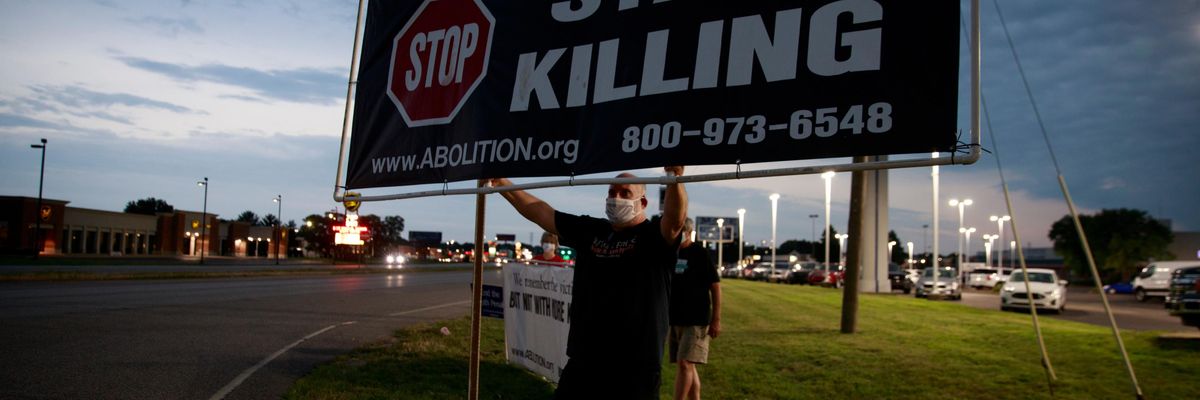Hanging was the worst use a man could be put to.
--Sir Henry Wotton, The Disparity Between Buckingham and Essex
It's back. The death penalty. In the Supreme Court.
A Google search discloses that 108 countries have abolished the death penalty for all crimes and another 144 have outlawed it in law or in practice. Fifty five countries still use it to discipline those who have committed certain offenses. We are among the fifty five. Although we executed 11 people in 2021, we try to be reasonable in its application. Proof of that is shown by two cases that have gone through the courts in the last two years. Both of them arrived in the court system because of what has proved to be a very tricky problem. In 2021 the problems involved Richard Moore in South Carolina and Michael Nance in Georgia. Both concerned the proper way to execute someone sentenced to death.
At the time of his conviction South Carolina generously permitted someone in Mr. Moore's position to choose which of the two state authorized methods of execution he would like to have applied to the event. The choices were between (a) the electric chair or (b) lethal injection. In the case of a prospective decedent who declined to choose, the default was (b). Mr. Moore declined to choose and his failure to choose meant the default would apply and he would be put to death by lethal injection. There were, as it turned out, no drugs available for lethal injection so the state was unable to execute Mr. Moore who had, as it were, the last laugh. His laughter was, however, cut short by the South Carolina legislature. It promptly added the firing squad as the default execution method instead of lethal injection and said that newly enacted method applied to Mr. Moore. Some may think it strange that a state can effect a change in how the death penalty is applied after the date it has been imposed but that is, apparently, not an issue. Thanks to some additional appeals Mr. Moore has now filed, how he will be executed is, as of this writing unknown. The issue is now before the South Carolina Supreme Court.
In the Georgia case the method of implementing the death penalty was considered in an opinion rendered at the end of the recent term of the United States Supreme Court. Michael Nance has been a prisoner on death row in Georgia for many years. He became eligible for the death penalty after he was found guilty of committing murder during a jar jacking and was sentenced to death. In Georgia those subject to the death penalty are put to death by means of lethal injections. During his years on death row, Mr. Nance developed a unique medical condition which meant that execution by lethal injection would be tortuous and a violation of the Eighth Amendment's prohibition against cruel and unusual punishment.
Because of the pain it would inflict on him, Mr. Nance brought a Section 1983 Civil Rights action to prevent Georgia from carrying out the death sentence by lethal injection. The United States Supreme Court had previously said that someone subject to the death penalty in one state may elect to be executed by a method of execution used in another state and, accordingly Mr. Nance said he wanted to be executed by a firing squad, a procedure not used in Georgia, but one used in four other states.
Georgia did not acquiesce in his suggestion and accordingly Mr. Nance brought suit in Federal Court to enforce his right to be killed by a firing squad. In considering his demand, the Federal District Court turned him down because, in non-legal terms, it said he waited too long to request a firing squad. Undeterred, Mr. Nance appealed to the 11th Circuit Court of Appeals. That Court wasn't concerned about the time it took him to file his appeal. In non-legal terms it said that he had used the wrong process and if it decided in his favor he could not be executed and, accordingly, denied his appeal. Mr. Nance appealed to the United States Supreme Court.
The Supreme Court rejected both of the lower court positions. It said its precedents made it amply clear that if a prisoner does not like the way a state carries out executions the prisoner "may ask for a method used in other states." It said that it would not be difficult for the Georgia legislature to pass legislation permitting executions to be carried out by means of the firing squad and Mr. Nance would then be the first beneficiary of that change. The Court was not concerned about the delay in Mr. Nance's appeal.
The foregoing is not a legal analysis of Mr. Nance's case. It is described to show how even though some think the United States should follow the lead of the 144 countries that have eliminated the death penalty, we at least are eager to execute people as thoughtfully as possible. The attorney representing Mr. Nance said the Supreme Court opinion provides Mr. Nance "a pathway to seek a humane and lawful execution." Not addressed is what it says about the United States, a country in which the person facing the prospect of execution has to take it upon himself to make sure it is done in a "humane" way. Go figure.

